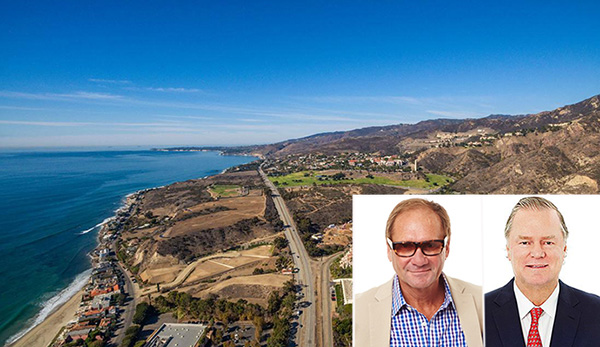Trending
The makings of a Malibu record: Everything you need to know about Big Rock’s $50M deal with Scott Gillen
It took the investor 12 years to entitle the property

Orchestrating a record-shattering land deal isn’t as simple as luck.
For private equity firm Big Rock Partners, it took 12 years, two investment partners, eight entitlement approvals, three separate offers, and a $4 million gift to California’s Department of Parks and Recreation.
The result of these efforts was big payout. It was “a gross amount of money,” according to Scott Gillen, who purchased the 24 acres of land in June for $50 million — the highest sale price for an undeveloped parcel in Malibu’s history.
But apparently, Big Rock was unwilling to accept a lesser bounty. The company knew it had a unique property on its hands, said Hilton & Hyland’s Rodrigo Iglesias, who represented Big Rock and its partner Oaktree Capital along with Rick Hilton.
“There’s no other piece of real estate along the coastline just like this, from Malibu to San Francisco,” he said. “Our targeted price was between $50 million and $60 million. They wouldn’t have sold it for any less.”
The land hit the market in October of 2016 with an asking price of $60 million. Big Rock and Oaktree came up with the ask by calculating the costs of infrastructure and construction, coupled with a handful of recent pricey sales nearby, such as David Geffen’s Carbon Beach compound, which traded for $85 million in May.
The land was in escrow twice, with a third backup offer.
“The first buyer — another developer — got cold feet [and] asked for a price reduction,” Iglesias said. “Scott got the second escrow and it was a smooth process.”
Entitlement troubles
Big Rock, in partnership with a New York hedge fund, bought the bluff-top plateau off the Pacific Coast Highway for $23 million from the Crummer family in 2005. From the very beginning, it was Big Rock’s intention to entitle the land, Robert Gold, a development partner at the company, told The Real Deal.
Even at the time of the purchase, the Crummer property was a significant piece of real estate. At least two or three projects had been proposed for the land before Big Rock acquired it. In the 1980s, General Motors wanted to build a think tank campus on the parcel. A hotel developer also eyed the property, Gold said.
It’s easy to see why none of these propositions came to fruition. Big Rock soon found the road to entitlement was a rocky one. Its first roadblock was obtaining approval from the city of Malibu, which wanted to use the land to house a number of ball fields. Big Rock wooed the city by agreeing to donate 1.7 acres of the land, worth about $4 million, for Malibu’s use.
But the property also required a Local Coastal Plan amendment — a process that Big Rock estimated would take about three years. The city of Malibu, however, had been at odds with the California Coastal Commission, and Big Rock soon found itself caught in the middle.
After the city gave Big Rock its blessing in 2009, the commission added a condition that the 1.7 acres of donated land be used for passive recreational use — in other words, not baseball or soccer fields.
The city didn’t like this idea, Gold said, landing Big Rock back at square one in its attempt to obtain the coastal amendment.
At that point, in late 2009, market conditions pushed the company into a hiatus. It restarted the entire process in 2012, when Oaktree hopped on board after a recapitalization.
In addition to repeating the hearings for the Local Coastal Plan amendment, Big Rock needed a vesting tract map, development permits for each of the five homes proposed and an environmental impact report, as required by state law.
“When we bought the property in 2005, we figured [it would be] a three-to-five year process,” Gold said, adding that the recession hit just as the first Coastal Plan Amendment approval expired. “It was stressful.”
The cost of it all “was not insignificant,” he said.
Up ahead
Wasting no time since the sale closed in late June, Gillen has already broken ground on the property. He started with landscaping, he told the Malibu Times this week.
When complete, the community will have five one-story homes, ranging from 9,500 square feet to 11,500 square feet. They will be priced between $40 million and $60 million each. Completion is slated for 2020.
“The Westside has grown extraordinarily in the past 10 years, so I see a clientele that may work in Santa Monica or Palisades but want to escape to Malibu,” Iglesias said. “Who wouldn’t [want to live there]? It’s just a matter of money.”




